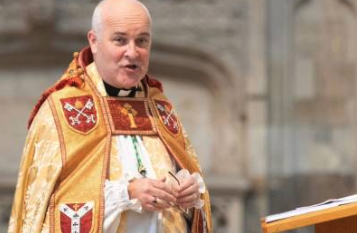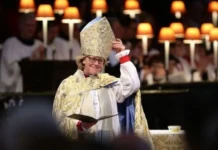ACCORDING to his official website, the Most Revd and Rt Hon Stephen Cottrell, the ninety-eighth Archbishop of York and second-in-command of the Church of England, has a track record in evangelism. In 1998, as the Diocesan Missioner and Bishop’s Chaplain for Evangelism in the Diocese of Wakefield, he joined Springboard, which was the Archbishop of York and Canterbury’s team for evangelism. To connect with the unsaved masses, he adopted nearby Huddersfield Town as his football team, while maintaining loyalty to his original, southern favourite Spurs.
Evangelism is the endeavour through which Christians communicate the good news of God, namely his indiscriminate and everlasting love for humanity. It is the sort of endeavour which makes churches grow, something that the Church of England, whose declining attendance figures suggest extinction within forty years, desperately needs to get right. The Church, whose congregations are overwhelmingly elderly, needs to attract children and young people to survive. Cottrell’s bone-headed failure to resign over his mishandling of the Church’s latest sex abuse scandal, that of the disgraced rector David Tudor, is going to deter parents from bringing their children to church. It is tempting to conclude that a church, which has failed repeatedly to deal effectively with hundreds of sex abuse allegations, does not deserve to survive.
With regards to David Tudor, the story goes like this. Tudor worked for the Church of England across parishes in London, Surrey and Essex for over forty-six years. He was seen as effective because of his powerful preaching which drew people to the Church. He was an area dean on Essex’s Canvey Island in 2010 when Cottrell was appointed Bishop of Chelmsford. According to one of Archbishop’s spokespersons, Cottrell would have been fully informed about the longstanding safeguarding concerns over Tudor.
In 1988, Tudor was a defendant in two criminal trials. In the first, he was acquitted of indecently assaulting a fifteen-year-old girl, admitting that he had sex with her when she was sixteen. In the second trial, he was found guilty of indecently assaulting three girls and served six months in prison. The conviction was later overturned because the judge had misdirected the jury. At this point, the Church did the right thing in response: a tribunal banned Tudor for sexual misconduct. Inexcusably, however, he was allowed to return to ministry after five years by former Archbishop of Canterbury, Lord Carey. One questions whether or not Tudor leveraged himself back into the pulpit through the knowledge of further scandals involving other members of the clergy.
In 2005, the Church suspended Tudor while police investigated an allegation that he had indecently assaulted a child in the seventies. He was not charged, and was allowed back to work. Since January 2008, Tudor had been working as a priest under a safeguarding agreement which meant that he could never be left alone with children, and was barred from entering any school in Essex. Despite this, Tudor was promoted and became an area dean, meaning he had oversight of twelve parishes.
Let us pause and take stock. Cottrell is not yet on the scene as the Bishop of Chelmsford, but one cannot go too far into this nauseating narrative without feeling the need to give a cathartic response. Allowing Tudor to officiate as a priest while banned from being alone with children or entering schools was an astonishing risk for the Church to take. Someone with a predilection for sexual behaviour with girls is likely to seek clandestine ways around the ban, with the result that more are abused. It appears that whoever made this decision was more concerned at retaining the Church’s superstar preacher than protecting children. Such a thing would not be tolerated in any other profession that works with children and young people, yet clearly the Church of England was playing – and still plays – by a different rule book.
Cottrell became Tudor’s diocesan bishop in 2010. In Cottrell’s defence, his office told the BBC that, for much of his time as Bishop of Chelmsford, he had been unable to take disciplinary action against Tudor due to all complaints against him having been dealt with. When a new complaint was made against Tudor in 2019, Cottrell acted swiftly by suspending him until he had been examined by a Church tribunal, which took the long-overdue decision of banning him from the priesthood for life. Cottrell might appear as the hero who finally brought this slippery villain to book; however, those calling for him to resign have excellent reasons for doing so.
Firstly, Cottrell permitted the risk of Tudor operating as a priest. How can someone, who cannot be trusted with children, properly undertake their priestly role involving pastoral work with youngsters? Such a person by definition cannot be a priest. If Cottrell was convinced by his advisers that nothing could be done about Tudor, then he could have at least prevented the man from being promoted. Yet, while Cottrell was his bishop, Tudor’s contract as an area dean was renewed twice, in both 2013 and 2018. Tudor was also appointed as an honorary canon of Chelmsford Cathedral during Cottrell’s tenure as bishop in 2015. Cottrell has argued that this was not his idea, but the result of a change in Church policy which meant that area deans were automatically made honorary canons. Why could an exception to this policy not have been made for Tudor? Surely someone who cannot be trusted around children was not worthy of an expansion of his ministry and allowed greater potential opportunities for abuse?
The bishop who stands out from all of this shame and disgrace is Helen-Ann Hartley, the Bishop of Newcastle, who has called steadfastly for Cottrell to resign. In an interview with BBC Sounds, Hartley explains (at 26 minutes in) what she would have done had she been Tudor’s bishop: she would have applied to the President of Tribunals for the removal of a priest to be held out of time and allow a review of evidence to be conducted. She is confident that such a review would have led to Tudor being disciplined. Hartley acknowledges that there would have been a risk of being sued by Tudor, but affirms that the moral and ethical principle would have outweighed it. Why did Cottrell not do this?
Read it all at the Conservative Woman



